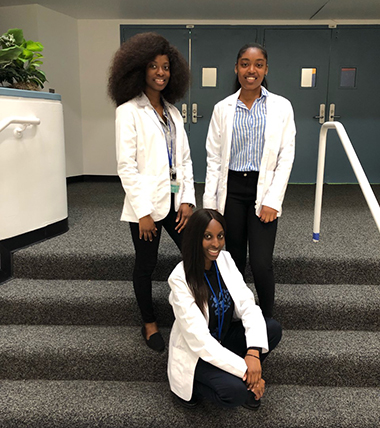Three EOP Juniors Explore Health Careers at SUNY Downstate
 |
|
Three UAlbany students during their summer 2019 experience at SUNY Downstate Health Sciences University: in front, seated, Mahil Sumbundu; standing, from left, Fatoumata Koita and Alexia Wilson. |
ALBANY, N.Y. (Dec. 3, 2019) -- Three UAlbany students spent their summer in Brooklyn, learning about different aspects of health care and getting a leg up on their future careers. But the experience also made them think critically about the disparities in health care resulting from class and geography, and the distance between doctor and patient. Mahil Sumbundu, Fatoumata Koita, and Alexia Wilson, all juniors from the Bronx, were pleased to talk recently about their experience in “Exploring Health Careers,” a program offered by SUNY Downstate.
The three EOP students attended lectures by health care professionals and took courses in medical terminology and career pathways. Two days a week were devoted to one-on-one shadowing of medical professionals for two or three hours each, to see what their daily routines were like.
They agreed that the program was an eye-opening experience. Between learning what the day-to-day routine is for doctors to talking to patients, “we saw a thing or two,” they said.
Sumbundu went to a kidney dialysis center where she shadowed a nephrologist. Koita spent time in the ICU, where she saw a patient just out of heart surgery, surrounded by doctors monitoring, checking pulse and other indicators.
“There was the actual heart doctor, but also the lung doctor, the medical students, a residency student,” she said. “They all could explain what was going on.”
The lectures were also illuminating. “Every week had a theme,” Koita said, “nursing, Medicare, physical therapy.” They learned about abortion rates around the world, and euthanasia. “They would talk to us about the field, and pass on inspirational things and advice.”
The experience made them aware of various opportunities in the health field, she said, such as being a therapist or a foot doctor.
One of the lessons they hadn’t expected to learn was the relationship that health care professionals have with their patients and how many patients are reluctant to trust their doctors, who they feel know too much and explain too little or have too little empathy for them.
Wilson said the experience opened her eyes to the disparities in medicine.
“A lot of minorities don’t feel comfortable talking to doctors,” she said. “Or they can’t afford to go to the hospital because they have no insurance.”
“I didn’t know there was this gap between average people and doctors,” Koita said. “If the doctor says ‘take this, take that,’ they don’t speak up, don’t ask ‘If I don’t take it, what happens?’ Or they just don’t take it – because they don’t trust the doctor.”
On the other hand, Koita herself feels very much at home around doctors. She was born in this country, but her parents came from Senegal and Gambia.
“I struggled with cancer as a child,” she said. “My brother has sickle cell – I’ve always been around doctors. Back in my parents’ hometowns, I probably wouldn’t have survived. Just remembering some of those moments really made me feel like this was my calling.”
Sumbundu said the speaker who most inspired her was a female obstetrician-gynecologist who went to Haiti, because it showed the possibility of going to other countries to provide health care for those who need it. In her own native country of Gambia, Sumbundu said, “women’s health is not the best. They experience tragedies, such as high maternal death rates.”
Sumbundu said she has been interested in helping people since her childhood. She decided to focus on ob/gyn at the end of high school, after witnessing how her aunt suffered from a C-section — because of the way it was performed, she was not able to walk normally.
“I want to make a difference by helping doctors train better and reducing the mortality rates,” she said. “I always wanted to do the international thing, but I didn’t know how to go about it. This showed me how.”
Wilson said she is motivated by her background.
“I’m from Jamaica,” she said. “Health care there isn’t so good. We (in the U.S.) have so much technology compared to other people in the world. I can give back to Third World people that don’t have the resources we do. They don’t have the privilege to even get care.”
“I would like to see more awareness of what it is to be a doctor,” Sumbundu said. For her this means increasing understanding in order to close the gap between doctors and patients.
All three agreed that in an interconnected world, health care workers have to work hand in hand with social workers, nutritionists and other professionals.
![]() For more news, subscribe to UAlbany's RSS headline feeds
For more news, subscribe to UAlbany's RSS headline feeds
A comprehensive public research university, the University at Albany-SUNY offers more than 120 undergraduate majors and minors and 125 master's, doctoral and graduate certificate programs. UAlbany is a leader among all New York State colleges and universities in such diverse fields as atmospheric and environmental sciences, business, education, public health,health sciences, criminal justice, emergency preparedness, engineering and applied sciences, informatics, public administration, social welfare and sociology, taught by an extensive roster of faculty experts. It also offers expanded academic and research opportunities for students through an affiliation with Albany Law School. With a curriculum enhanced by 600 study-abroad opportunities, UAlbany launches great careers.


